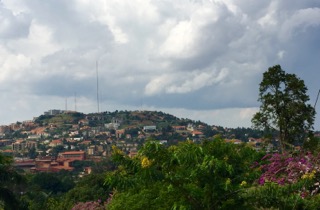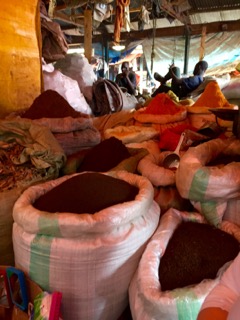Introduction to Kampala
I arrived in Kampala, Uganda one week ago to begin my internship with USAID’s Supporting Access to Justice, Fostering Equity and Peace (SAFE) Program. After arriving late Saturday night on May 30th, I was able to settle into my apartment and spend Sunday exploring Kololo, a residential area in Kampala where my apartment is located. The walk from our apartment to the main shopping area offers a spectacular view of Kampala.
This is SAFE’s first year as a part of the Comparative Legal Studies and Post-Conflict Peacebuilding summer internship program at William & Mary Law School. Emily, the other intern in the SAFE office, is also a William & Mary law student. Our office is in Nakasero, the central business district in Kampala, and neighbors numerous other international aid organizations.
Last week, Uganda celebrated a public holiday, Martyrs’ Day, giving Emily and I a chance to explore Kampala. We began the day at 1000 Cups of Coffee and, after finishing our coffee, walked downstairs to Edro, a shop where you can buy fabric and order custom clothing from the tailors working in the shop. From Edro, we ventured across the street to the smaller of the two craft markets in Kampala. As it was a public holiday, few people were visiting the market. We spent some time looking at each stall and the different items each offered.
Our next stop, Owino Market, offered a much different pace than the quiet craft market. As the biggest market in Kampala, Owino offers everything from electronics to secondhand clothing and fabric as well as the traditional spices, fruits, vegetables, and other edible items expected
.
A Ugandan SAFE team member guided us through Owino, showing us the clothing, spices, and freshly made peanut butter; without him, I doubt Emily and I could have found our way out of the maze that is Owino. I am still amazed that local Kampala residents are able to navigate through the market, finding their preferred merchant time after time, while fighting the immense crowd of people. After returning to our car, however, I was informed that Owino was particularly empty that day by Kampala standards. It’s hard for me to imagine more people inside Owino but our guide informed me that people slide past one another with little to no room for free movement on a typical day.
The Ugandans I have met over the past week are excited to show Emily and I the country and culture. Our downstairs neighbor, upon learning we recently arrived in Uganda, invited us for a traditional Ugandan meal, serving us matoke, cabbage, spinach, cassava, and beef stew. We were able to watch the preparation of the matoke, which involved the peeling of the matoke (a plantain), steaming in banana leaves, and the eventual mashing to a smooth consistency. In addition to watching the preparation of the food by the women, Emily and I were able to speak to the father of the family about his childhood in Uganda and the changes that he has seen over the years.
The staff in our office make sure that we always have something to do or see, recommending activities, restaurants, and places to visit. A temporary project headquartered in Kampala, SAFE focuses on building local communities’ understanding, awareness and access to justice in land matters in twenty districts throughout Uganda and addressing underlying causes of instability by enhancing conflict mitigation and reconciliation processes in conflict prone regions. The first week consisted of an immense amount of reading as Emily and I familiarized ourselves with the SAFE grantees, their projects, and the land title system in Uganda. Although much of the land title system echoes that learned in my first-year property course, Uganda also possesses a customary tenure system that defers to the traditions, norms, and practices of a specific community. The customary tenure system does not require a traditional land title to prove ownership. Ownership may be proved with a “Certificate of Customary Ownership” but also may be demonstrated through witnesses or word of mouth supported by map sketches or receipts. Many Ugandans do not possess formal land titles for land that their families may have cultivated for many generations. Traditionally, land titles were passed down orally. For example, if a father informed the village elders that he transferred a plot of land to his son, the son gained all the rights associated with true ownership of that land. With the discovery of oil in Uganda and the increased exploration in search of extractable mineral deposits, the lack of more formally documented land titles has led to an increase in land grabbing in many of the regions, resulting in multiple claims of ownership to a single plot of land. Due to the reliance of many families upon land as their source of livelihood, such conflicting claims of ownership create instability and conflict.
Although it has only been one week, it feels like I have been here much longer. The country is beautiful and the Ugandans are unbelievably welcoming, fostering a feeling of comfort in a new city. There is much more to learn and do while I’m here and I’m sure that the next nine weeks will fly by.

